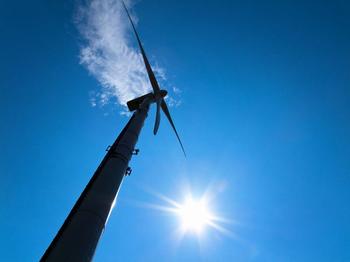Graduates in Academia and the Research Sector, Government Ministries, and the European Commission
The Environmental Policy Research Centre looks back on a 30-year success story.
May 25, 2016
The “big wheel” turns in Germany: According to calculations by the Strom-Report portal, about 45 percent of the wind turbines installed in Europe are located in Germany.
Image Credit: picture alliance/Blickwinkel/McPHOTO
On April 26, 1986, the Chernobyl nuclear power plant, in what is now Ukraine, was the site of the world’s first nuclear disaster, when a true “worst-case scenario” unfolded. The Environmental Policy Research Centre (FFU) at Freie Universität had been founded just three days before as a research unit.
“Chernobyl brought the subject of environmental protection to the fore, especially in Germany,” recalls Professor Martin Jänicke, the founding director of the FFU.
There had already been environmental policy research at Freie Universität before then, but, as Jänicke explains, “We wanted to pool this research together in one location, and besides that, we needed a fixed institution in order to be successful at external fundraising in the long term.”
The FFU made headlines throughout Germany for the first time not long after it was founded, in September 1986, when a study by the center on the use of nuclear energy was published. The results showed that it was possible to stop using this form of power generation in Germany within four years. “It was then that people in Germany began increasingly believing that halting the use of nuclear energy did not have to be a disaster,” Jänicke says.
That was also thanks to the research center and its particular understanding of its role: Alongside research on political science, the scholars at the FFU were also always involved in political consulting. And their expertise is sought after to this day; the head of the center, Miranda Schreurs, a professor of comparative politics, was a member of the German Advisory Council on the Environment until just recently, as Martin Jänicke had been before her.
Even the European Commission and the OECD rely on advice from the researchers at the FFU. One particular highlight came in the form of an engagement by the Heinrich Böll Foundation and Friedrich Ebert Foundation in 2002. In the run-up to the negotiations surrounding the formation of a coalition government between the SPD and the Greens, the center produced an expert opinion that explored the possibilities for various steps in environmental policy for the next legislative period.
The researchers at the FFU definitely do not view their political consulting activities as a one-way street. “We learn a lot ourselves, for example when we visit a ministry and see how concrete political work is done there,” says Klaus Jacob, the research director at the FFU, who has a doctorate in political science. “This stimulates our academic work,” he points out. For example, it helps the researchers analyze “best practice” models. “We try not to get stuck on the legitimate criticism that current environmental policy is inadequate. Instead, we try to use examples of best practices to show that something can be done about it,” Jacob explains.
While the center’s observations were initially confined to industrialized nations, the FFU now focuses on developing countries and emerging economies as well. “It’s interesting to see that there are innovations in the environmental sector there that the industrialized countries can learn from,” Jacob says.
Jänicke sums up the center’s greatest success this way: “We have been able to show that the state has the potential to solve problems. It is possible to design environmental policy in such a way that it offers an opportunity for innovation instead of standing in its way.” The FFU also engages in fundamental research. “That’s our base,” Jacob says.
He explains that the center is a leader in “policy diffusion” research and ecological modernization. FFU researcher Roland Zieschank was involved in developing the German National Welfare Index. Instead of being calculated based purely on economic factors, like GDP, the index also takes account of ecological and social factors that focus on the subsequent costs of doing business.
The index is now used in several German states. Over the past 30 years, several hundred young people have studied at the Environmental Policy Research Centre, and more than 100 dissertations have been written. “You can find our alumni everywhere, at all the important political consulting agencies, the European Commission, in government ministries and at all the major research institutions,” Jacob says.
The center’s scholars are convinced that there will be plenty of subjects – and plenty of research projects – for the FFU to tackle in the future, too. “There is a longstanding tradition of thematic innovation here,” Jänicke says, adding, “We aim to continue it.” And there are many new ideas, too, as Jacob points out. “We’re not going to rest on the achievements of the past 30 years,” he says.
This text originally appeared in German on April 16, 2016, in the Tagesspiegel newspaper supplement published by Freie Universität.

